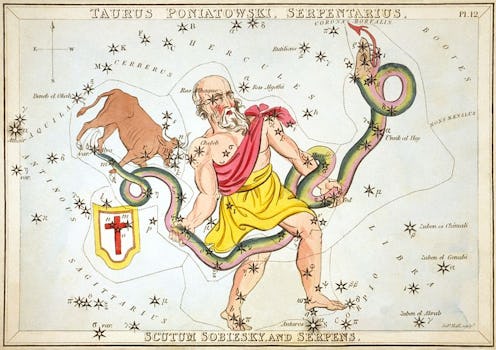Life
What Does The Word "Ophiuchus" Mean?

Big news from NASA had me reeling this September — and no, it wasn’t about a planetary discovery, but an astrological one. It seems my birthday, Dec. 14, falls in range of the 13th sign of the zodiac, making me an Ophiuchus instead of a Sagittarius. I suddenly had so many questions: What does the word “Ophiuchus” mean? Do I really have to change my sign? Has every horoscope I've ever read been a lie?? Commence identity crisis in three, two, one...
I have always been a proud Sagittarius and deeply related to the sign's assigned traits. I love to travel and explore the great outdoors, I prize my freedom, and hold myself to high standards. The fire sign always seemed a perfect fit. But just because I've been a centaur my whole life doesn't mean that I would immediately disregard Ophiuchus (especially if NASA is backing it), so I went in search of some basic facts about my ~new~ sign.
Ophiuchus' dates range from Nov. 29 through Dec. 18 (determined by when the sun passes in front of the constellation). The word is a latinized version of the Greek Ophioukhos, "ophis" translating to "snake" and "ekhein" meaning "to hold." The Ophiuchus constellation is known as "the snake bearer" as its boxy shape divides the constellation Serpens (the snake). It is often depicted as a muscular man draped in robes wrestling a large serpent — pretty cool, I guess. Ophiuchus has quite a few (confusing) origin myths. Some say the image comes from Asklepios, the Greek god of healing and medicine, while others look to a person named Imhotep who lived in Egypt in the 27th century BCE. Those born under Ophiuchus are said to be seekers of knowledge and great truths, as well as natty dressers. Not too shabby, but still not enough to convince me to switch signs just yet.
According to the article on NASA's educational page Space Place that ignited the debate, some 3,000 years ago, the ancient Babylonians invented the zodiac. These ancient peoples keenly observed the path of the sun and moon in relation to constellations. They believed that constellations and their placement were important and could affect people on earth. As the earth orbits the sun, on the year long journey the sun appears to pass through 12 constellations, and these became the zodiac according to the Babylonian's 12-month calendar.
Myths and stories were formed around the star shapes, endowing them with meaning. The word "zodiac" is a latinized word derived from the ancient greek for "circle of animals." Each zodiac sign is connected to a myth of the gods taking animal form — hence why Pieces is represented by a fish, Aires is a ram, and so on.
Originally, there were 13 constellations in the Babylonian zodiac, with the Ophiuchus constellation also in the sun's path. This didn't fit neatly in the 12-month calendar, so for whatever reason, Ophiuchus was left out.
Does that mean that I now am a member of a zodiac sign that was trashed thousands of years ago? Is it possible that Ophiuchus was just not good enough to fit in the Babylonian's perfectly balance system? For the last 2,000 years, we have stuck with this 12-sign arrangement; however, times have certainly changed. As NASA points out, these constellations are no longer in the same place today because of a subtle wobble in the Earth’s axis. There is still a lot to be learned about Ophiuchus, and most experts say that I do not have to go by the 13-sign zodiac if I so choose. It's going to take a little more research to convince me to make the change; so I guess it's time to have my charts done.
Images: Sidney Hal, Soerfm, Till Credner/Wikimedia